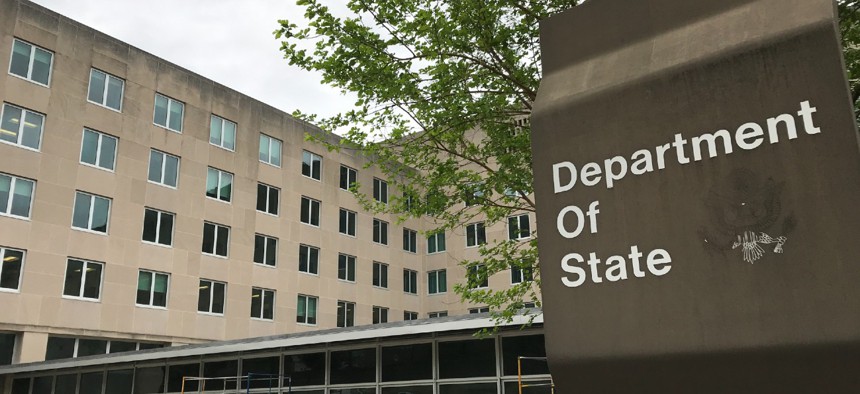
Kiyoshi Tanno / iStock.com
House Easily Passes Measure to Boost Hiring, Bonuses at State Department
Lawmakers say the "momentous" authorization bill, the first in 20 years, would "prevent the politicization and targeting and impunity" that have hurt morale at the department in recent years.
The House on Tuesday easily approved a bipartisan measure to better support the State Department’s workforce, including by increasing hiring, retention and bonuses.
The 2021 State Department Authorization Act (H.R. 1157) would be the first such broad operating guideline for State in nearly two decades and would focus on boosting the department's ranks of foreign service personnel and civil servants. After years of shedding staff and faltering efforts to improve diversity within the diplomatic corps, the bipartisan sponsors of the legislation said their bill would address the “vexing” problems facing State.
The legislation would require State to issue two major reports. Within 18 months, the department would have to issue a five-year strategic staffing plan. The document would identify shortages in both the civil and foreign services, broken down by grade and job type. State would put forward its desired number of employees for both services, including where each worker would be located. It would also be responsible for documenting the root causes for current worker shortages.
At a more than 10% cut in four years, State saw the second biggest workforce decline under President Trump, trailing only the Education Department. The measure would create new restrictions on reductions in force and separation incentives at State.
Rep. Gregory Meeks, D-N.Y., who chairs the House Foreign Affairs Committee and co-authored the bill, said Congress’ failure to pass a State Department authorization measure over the last 20 years marked a “missed opportunity” to give American diplomats the support they need to carry out U.S. interests. The bipartisan bill, he added, represented a “historic opportunity.”
The bill is “not just about policy,” Meeks said on the House floor Tuesday, “but about the brave and dedicated public servants who work tirelessly to keep our country safe.”
President Biden has similarly promised to empower career employees at State, saying in a February address to them that they were fundamental to his agenda.
“The main message I want to communicate to you all is whether you're part of the newest class of foreign service officers or you’ve been here for decades in the civil service or foreign service, or you’re locally employed staff, you’re vital and the strength of our nation depends in no small part on you,” Biden said. “You are the center of all that I intend to do. You are the heart of it.”
The second report would focus on diversity efforts. State would within six months of the bill’s passage publicly document its demographic data by applicants, job type and promoted workers. It would assess the department’s effectiveness in enforcing anti-harassment and anti-discrimination policies and its ability to recruit a representative workforce. State would have to issue updates annually.
Meeks lamented that the State workforce has not looked like the country it represents and said his bill would “ensure a more diverse, equitable and inclusive department.”
The bill would also make it easier for former foreign service officers to reapply for their old jobs and remove certain qualification requirements for foreign affairs positions at the discretion of State leadership. It would create a bonus program for civil servants that was previously only for foreign servants and reinstate recruitment, retention and relocation incentives for difficult-to-fill posts. Any employee in a combat zone would be entitled to 20 days of rest and recuperation leave. The measure would also ensure all interns are paid, which Meeks said would create a “strong and diverse pipeline over the long term.”
The bill would also expand the State secretary’s ability to indefinitely suspend without pay any foreign service officer who loses his or her security clearance or commits a crime. It would expand appeal rights for State workers to those who are restricted or precluded from a certain position.
State would face a new requirement to occasionally conduct interviews with employees to assess why they remain in their jobs, and to conduct exit interviews with all departing workers on their reasoning for leaving. The department would have to catalogue those responses and use the information for potential policy changes. The measure would require State to create a recruitment plan for historically underrepresented groups and improve its professional development opportunities.
Meeks stressed that the bill was particularly necessary after four years under Trump and alluded to political targeting and retaliation that took place under his watch. He and others highlighted new accountability measures, as well training and skill development opportunities the bill would provide to open up senior leadership positions to a wider net of workers.
“There are several vexing management challenges that have gone unaddressed for too long, and the politicization, neglect and slashing of resources we saw during the previous administration made it harder for our diplomats to do their jobs,” he said. “The bill will also help to prevent the politicization and targeting and impunity that has caused so much harm to the members of the workforce and their morale.”
The measure will now head to the Senate, which failed to take up a similar bill in the last Congress.
“I hope the Senate does not allow that to happen again,” Rep. Mike McCaul, R-Texas, the top Republican on the Foreign Affairs committee and the bill’s co-sponsor. “It really is desperately needed. This is a momentous day for the House.”







